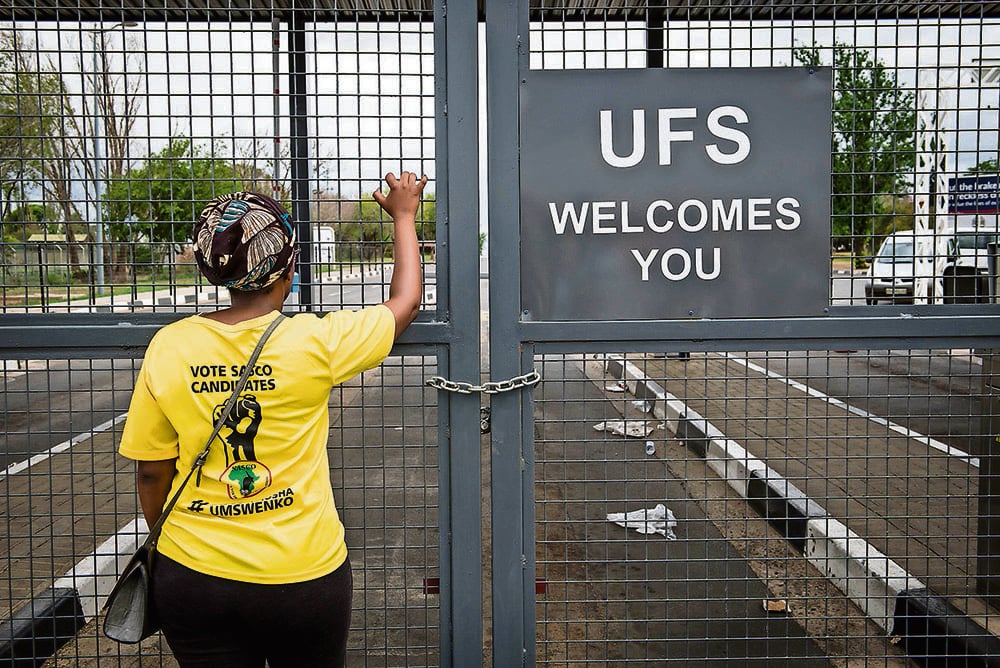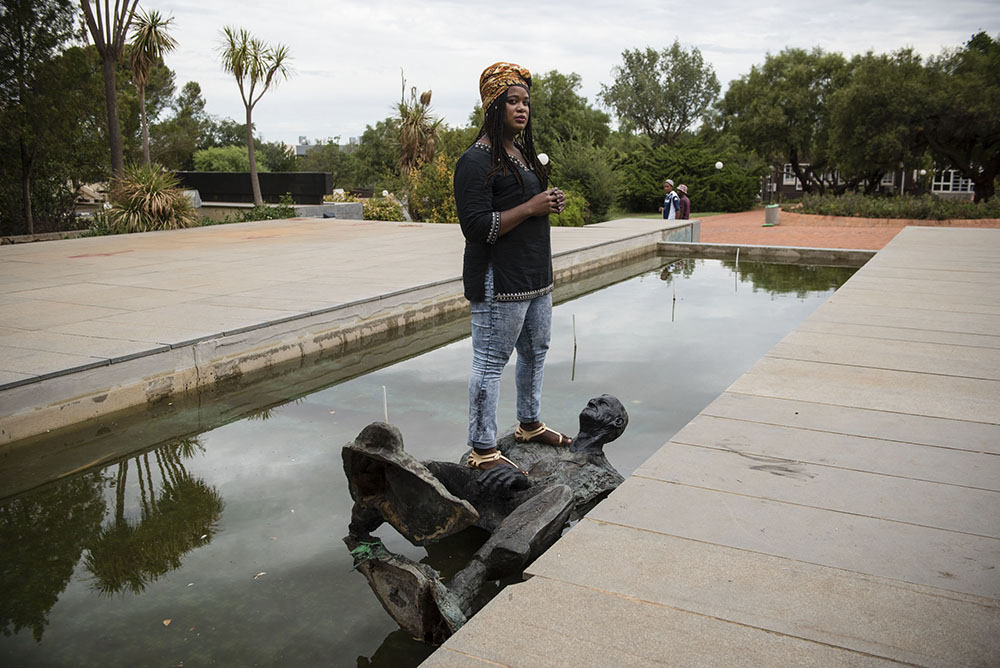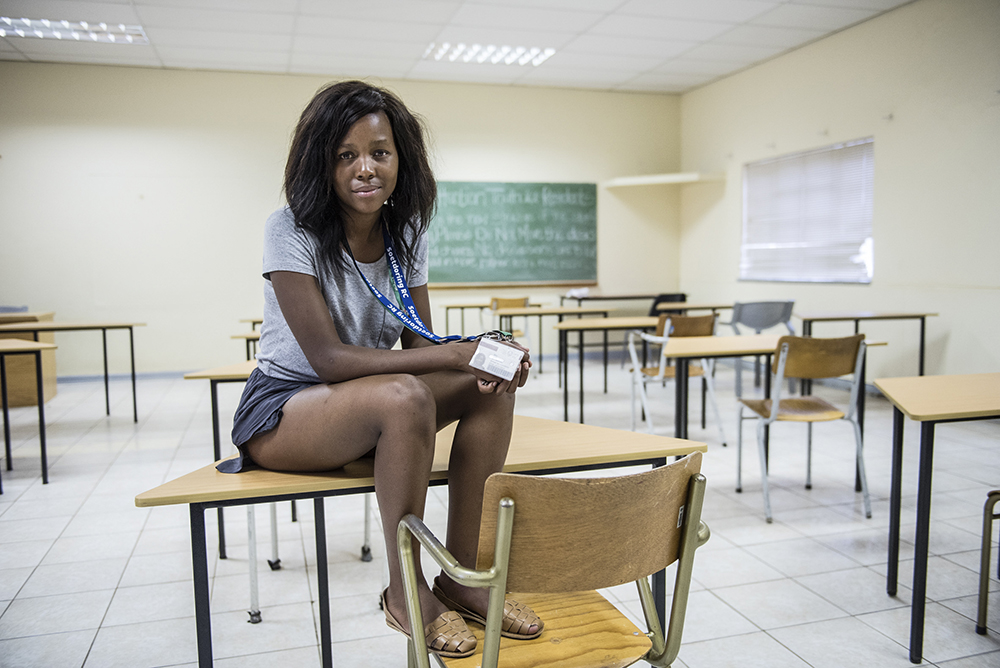After handing over a memorandum to University of Free State management
Hands are raised at the gates to the University of the Free State. The hands are black and white – #Colourblind, an off-shoot social movement to pray for unity amid violent racism. As the supplicants entreat the heavens, their eyes are closed.
Second-year law student Mosa Moerane is caught between protest and prayer. She is a devout Christian and a black student who believes that the transformation project at the university is nonexistent and was abandoned by university authorities before it even began.
She finds the approach of Christian Revival Church’s (CRC) to be a silencing tactic that erases her intersecting identities. “I am still black on Sunday, I still can’t afford fees when I am praying in church. I have never thought of choosing my blackness over my faith, but today I was forced to,” says Moerane.
The crowd at the main gate of the university is visibly divided – in one camp there are those immersed in prayer and worship, and in the other those who are singing struggle songs that echo from afar. Between them is a sea of police, ensuring that the groups remain apart.
“We are here to pray for the peace and stability in the universities and for the country at large. We are standing in the gap and asking God that He intervenes during this time,” said Shaun Nortje, an intern pastor at Bloemfontein chapter.
Nortje says many of the young people in church study at the UFS and that is why they found it necessary to come and intervene in prayer.
But “the gap” the church group seeks to fill has drawn a backlash from many of the protesting students, who say the church is appropriating the workers’ and students’ struggle.
“They were not here for us during #FeesMustFall. It is wrong for CRC to assume a position of authority in a struggle they have not been part of,” says Moerane.

Mosa Moerane is a Christian and a black student and feels she has been forced to choose between the two. (Photos: Troy Enekvist)
Students from the CRC’s Pretoria branch also held prayer meetings at the University of Pretoria on Tuesday. The church group also started a social media campaign called #Colourblind, which advocates unity, reconciliation and a stop to racism “from all races”.
Many of the protesting students accused CRC of being opportunistic and insensitive to their pain and the reasons for the protests.
Nortje said the church is not political or affliated to any political party. They are here to declare an end to racism and pray for the leaders of South Africa.
Historically, religious organisation have been involved in many protest movements. During apartheid, many spiritual leaders condemned using religious-based morality to further the struggle. Even during #FeesMustFall, Pastor Xola Skosana, of Way of Life Church in Khayelistsha, rose to prominence because he and his church declared their solidarity with the students.
Many UFS students believe the violence witnessed this week started well before the nationwide shock over video footage of white spectators who ran on to the field to attack black students and workers who disrupted a rugby match. The issues they are protesting about existed long before the 2014 case of Damani Gwebu, a black student who was run over by two white students on campus. Many students believe it started even before the infamous Reitz Four incident, in which five black UFS employees were humilated by four white students.
“The biggest problem at UFS is that it is built solely for the purpose of preserving Afrikaans culture. The inclusion and education of black students is simply distracting them from this,” said Delia Moumakwe, who is the arts and culture officer of the Students’ Representative Council.
She also supports the call to scrap Afrikaans as a language of instruction at the university, saying that white Afrikaner students feel they are entitled to study in Afrikaans while black students, who are in the majority at the university, are not afforded the same privilege. She also believes that the language policy is being used as a shield for the bigger issues they are fighting against – the institutionalisation of white Afrikaans culture in the university.
“Afrikaans is not just a language at UFS, it is a way of life, and it is that that they are trying to protect more than anything.”

Seoketsi Moeketsi, a black queer trans womxn, is fighting for a dignified existence at the Univeristy of the Free State.
Earlier on on Monday, 37 workers and two students were arrested for an illegal strike and breaching of a court order, which resulted in the protest at the rugby game. The attack on the protesters revealed the deeper racial issues at the university.
A large group of the protesting students was unhappy about the presence of the multiracial prayer group, describing them as being out of order and disrespectful.
Mbodi Muthambi, a UFS student who often attends the CRC’s Sunday services, said the church would be more helpful if they donated food and water to the movement.
Nortje said the church may not contribute directly to the student movement through the SRC office but can make individual contributions. He said they have helped many disadvantaged students at the university.
Solidarity is an integral part of the various protests at the UFS. Outsourcing, transformation and fees have been prioritised, but these do not encapsulate the struggles of all the students. Seoketsi Moeketsi is a second-year anthropology student, a black queer trans womxn, who is fighting for her right to a dignified existence at the university.
“My life at UFS has been suffocating. I cannot breathe in this university.”
She is confronted not only by the anti-black culture of the university but also by patriarchy and transphobia, 24-year-old Moeketsi said. Most of her lecturers don’t ask what pronouns she would prefer them to use when addressing her and refer to her in whatever manner they choose.
“I only use disabled toilets on campus because it is the only place where my peeing is not politicised. I have never tried to enter the men’s bathroom; I am too scared.”

Delia Moumakwe, Arts and Culture officer for the Free State SRC, says white Afrikaner culture is institutionalised at the university.
Moeketsi said the university does not take transformation seriously and the rector, Jonathan Jansen, is merely there to maintain the status quo.
The discrimination Moeketsi faces does not only come from the university management but also from fellow students, which forces her to perpetually sacrifice her queer identity to take up the struggle of black students.
“I don’t belittle the overall issues of black students, but we need to re-evaluate what and how the black students we claim to be fighting for looks like.”
Things took a sour turn at the North West University’s (NWU) Mahikeng campus on Wednesday when live ammunition was allegedly used on students and a fire damaged the university’s administrative and science building. The university’s management has closed the campus indefinitely. Students at the Nelson Mandela Metropolitan University also occupied part of the campus, and academics at the University of Cape Town staged a silent protest.
It is not clear when university campuses will return to normal but student movements have vowed to continue the protests until their demands are met.
There is a common thread running through the student protests around the country, but UFS students believe that the battle they face is more challenging than those at UCT or the University of the Witwatersrand.
“Stellenbosch University and the NWU Potchefstroom campus are the only others that face the kind of crisis we face here. White Afrikaner culture dominates our campuses through statues, in our residences through culture, and our lecture halls through the dual language policy,” said Moumakwe.
‘Students have nowhere to go’
Images of charred buildings and bloodied students have mapped the chaos that erupted at the North-West University’s Mahikeng campus this week. In the aftermath of the violence, students are still determined to fight on.
President Jacob Zuma has condemned the student action on campuses in Pretoria, Mahikeng, Bloemfontein and Cape Town. Zuma said the burning of buildings cannot be condoned, regardless of how angry students may be. Kgadi Bontle (21), a second-year law student, is a student leader in the protest movement developing in Mahikeng. After violence erupted during a meeting regarding the student representative council (SRC), students were ordered to vacate the university immediately. Sitting outside the university, trying to work out what to do, Bontle spoke to the Mail & Guardian.
“Students have just been ordered to vacate, but we don’t know where we are going to take our students. Most of them don’t even have money and this university is in the middle of the rural areas,” he said.
On the day the violence broke out, students were attending the inauguration of the SRC, which the university management had selected after the previous one had been dissolved. According to a statement released by the university, the dissolution followed “earlier disruptions of academic and administrative activities”. But Bontle says many students do not recognise the management-selected SRC as leaders.
“Some of the people that we have here in this leadership, we don’t even know them, we’ve never seen them. They don’t represent us,” he said.
At the inauguration, students who were opposed to the new SRC shared their views, but, according to Bontle, the university did not acknowledge them. He says talks broke down when the university ordered private security guards to disperse the crowd.
Allegations soon emerged on social media that security officers had fired live ammunition. Students, including Bontle, photographed bullet casings and shared them on social media.
The conflict ended when the administration block, which includes the science centre, burst into flames, allegedly after a student threw a petrol bomb into the building.
The fire spread to a residence supervisor’s quarters and the university has now said the campus will remain closed indefinitely.
Bontle and the rest of the student group are preparing a memorandum of demands to hand over to university management.
As they spent the morning sitting outside the university after the campus’s closure, students at the University of Pretoria (Tuks) were starting their #PrayerWalk.
In the wake of protests against Tuks’s language policy, the #Colourblind campaign sprang up in conjunction with student church groups. The campaign encourages nonracialism in a bid to forge unity and saw students sharing selfies on social media.
The #PrayerWalk was a follow-up to the #Colourblind campaign, which saw students gather at Hatfield campus and hold hands in prayer.
Critics, however, critics have lambasted the #Colourblind and #PrayerWalk initiatives as being blind to the inequality and racism that persists. – Ra’eesa Pather